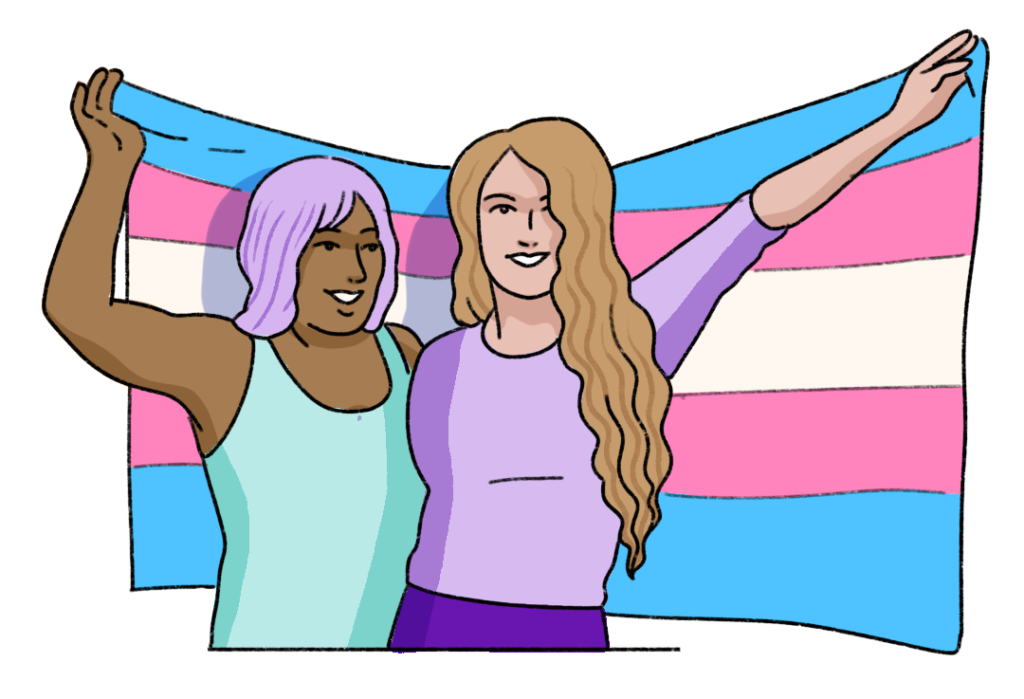By Foster Rudy
Confetti, community, and non-alcoholic champagne? Yes, please. While Pride can seem like a wild, booze-soaked parade, plenty of queer people party sober, too. Substance free and sober events, groups, and spaces are inclusive for people with substance use disorder—or those of us who are taking a break, too. Giving up substances doesn’t mean giving up your community or your fun. If anything, abstaining might help you dance longer, party harder, and still remember what you did the next morning. (If you are celebrating Pride with a cup of tea in your own living room, that’s great too.)
For many of us, transition is or was an opportunity to connect with our own bodies in different ways and for some of us, this leads us to sobriety, either temporarily or for the long run. We know it can seem like the only places where trans people can gather are bars and clubs, where alcohol is served. For folks who struggle with substance use, alcoholism, or addiction, this can make being in community challenging. However, there are plenty of options for connection and celebration that support wellness and recovery.
LGBTQ+ People and Substances
First, the numbers. While substance use might seem universal, only about half the world’s population indulges. It’s more and more common for people to skip alcohol or drugs, and there are plenty of good reasons. Sobriety is linked to better wellness outcomes, from the short term (Decreased STI transmission rates!) to the long term (Less likelihood of cancer! Lower suicide risk!). Sobriety supports healthier relationships, better mental health, and improved self esteem. Sobriety is less expensive than even recreational use.
Also, you don’t have to have a problem to take a break or celebrate Pride without substances. Not every party is going to be for every person, and if you get tired of trying to talk to strangers who are slurring and stumbling on the dance floor—you don’t have to stay. Being able to leave at the right time is a sober superpower, and getting home without being pulled over for a DWI/DUI is pretty great, too.
Of course, the use of alcohol and other substances often plays a role in trans people’s lives. Some folks use alcohol or other mind-altering substances to let go or explore in healthy ways, while other folks struggle with substance use issues or addiction. Everybody’s relationship to substances is different. Some people can take it or leave it, and others are happier and healthier when they’re substance-free.
Although queer life can seem like it’s centered on drinking or drug use, that’s not the only story. Our community has a high frequency of use—but that doesn’t mean everyone is getting loaded all the time. (Or that you have to get high to fit in.) Every major city has at least one LGBTQ recovery group as well as super-cute substance-free meetup opportunities. Most bars serve mocktails and all of them have zero-proof options. (Tell the bartender you’re the designated driver, and your soda-with-a-twist might be on the house!) Also, some queer spaces, such as BDSM and kink events, are totally substance-free to ensure that people feel safe and empowered to consent. When you’re changing your relationship to substances, know that there is space for you in the community. You don’t have to feel left out just because you’re leaving substances out.
Recovery Support for Everyone
“Whatever you’re doing, there’s a full spectrum, from wild to mild,” said Dr. Alann Weissman-Ward, an addiction medicine specialist and a medical provider with Plume. “The most important part of getting sober support is making sure you have someone who is on your side.”
That someone could be a non-drinking friend, sober ally, or professional support. If you feel intimidated by going to a Pride event sober, bring a buddy who can hold you accountable while you celebrate in a way that doesn’t involve substances. Knowing that you aren’t the “only one” can make a big difference. If you are at an event and you start feeling uncomfortable, bored, or resentful of the people who are partaking in substances—you can change your situation. People often drink or use in response to other people, places, or feelings. You can hang out with a different group, take a short break, text a friend, or move on to the next event. Putting your wellness first doesn’t always come naturally, but just like the other choices you make, once you start doing it, the rest will follow.
What If I Can’t Stop?
Some people struggle to stop using substances, even when they want to. Quitting cold turkey is very challenging, and in some cases, medication can be helpful. Naltrexone is one harm reduction option for people who are having trouble with binge drinking. The medication helps block the euphoric feeling that comes with heavy alcohol consumption. (For the record, if you drink heavily every day, don’t try to stop suddenly on your own. Detox can cause seizures, hallucinations, and other dangerous side effects and should only be attempted with medical help.) Other harm reduction options for tapering off or quitting are medications like methadone, suboxone, or changing the way you use the substance.
Although quitting substances may be challenging initially, it’s important to keep trying. “Don’t be afraid of failure,” says Dr. Weissman-Ward. “You should be absolutely proud of yourself. Getting sober takes a lot of courage and honesty. When you commit to sobriety, you’re taking steps toward living the full, healthy life you deserve.”
The key ingredient in achieving and sustaining recovery is community. Most trans people have been on some kind of journey to coming home to their own bodies or finding comfort inside their own skin. At various points, that might leave us wanting to escape or disconnect from reality. Finding a place that feels safe and welcoming will bring you closer to your identity, which is so much bigger than your gender, sexuality, or personal expression. Wholeness is a gift that every trans person deserves. When you make your needs and desires a priority, you claim your space—and help other people see what’s possible, too.




